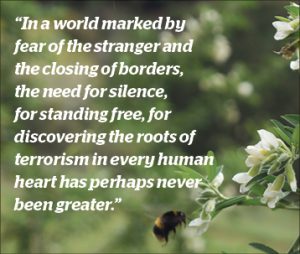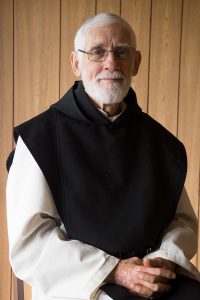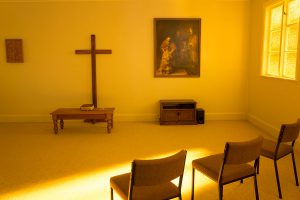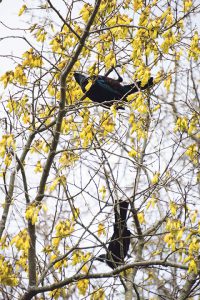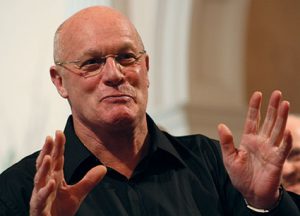WelCom July 2017: “Today we live in a world of constant overwhelming electronic transmissions: radio, TV, internet. It is only in turning them off that the voice of God can be heard.”
The Sounds of Silence
Fr Neal Vaney
In the First Book of Kings (1 Kg 19.9-18) in the Hebrew Bible there is a dramatic episode. The prophet Elijah is trying to call the people of Israel back to worship the true God. After slaughtering 450 of the prophets of Baal on Mt Carmel he flees into the Sinai desert to escape the vengeance of King Ahab. Hiding in a cave on Mt Horeb, he waits to hear God’s voice. First comes a great wind, then an earthquake, then fire – all traditional signs of God’s coming. But he is not in any of these. Then the tiniest of breezes springs up – the Hebrew is almost impossible to translate, ‘a sound that is not a sound’– and God speaks out of that.
Today we live in a world of constant overwhelming electronic transmissions: radio, TV, internet. It is only in turning them off that the voice of God can be heard.
The need to listen
For the past three years I lived in a house just below Victoria University. In the morning as I drove out to work dozens of students would stream across our driveway. I soon learned to inch out as many of them crossed my path with iPod plugs in their ears, quite oblivious that they could end up just like the prophets of Baal.
From the earliest days of the Church there has been a constant flow of men and women who have headed into the wilderness to escape the hubbub of life and to listen for the voice of God. As Roman government and authority collapsed at the beginning of the fifth century a steady stream of pilgrims headed into the Egyptian and Syrian deserts to try to discover what God was saying in those turbulent times. There, men like Macarius, Arsenius and Evagrius of Pontus, discovered similar wasted vistas between the deserts in which they dwelt and their human hearts where self-deceit, deeply buried fears and resistances prevented them from being free.
Today’s deserts
What they discovered has resonated even into our times. Such was the life of Thomas Merton. Son of a Christchurch artist, he lived a racy student life in Cambridge then Columbia University, New York, leaving an illegitimate child and a string of debts behind him. In the writings of the poet Blake and the Catholic philosopher Gilson he glimpsed another world opening up. His journey led him to the Cistercian monastery of Gethsemani in Kentucky. Fleeing to redeem his past in silence and solitude, he became the most famous Catholic in the USA because of the immense success of his best-selling autobiography, The Seven Storey Mountain. Appointed master of scholastics, then of novices, he plunged into the lives of the desert solitaries, translating many of their sayings in his work, The Wisdom of the Desert, in 1960. Paradox moulded his life also. More and more he felt the need for solitude, finally settling into a hermitage in the monastery woods in 1964. From there issued forth his most trenchant critiques of American life and values, in writings on the Vietnam war, nuclear proliferation, civil rights and non-violent resistance.
In a world marked by fear of the stranger and the closing of borders, the need for silence, for standing free, for discovering the roots of terrorism in every human heart has perhaps never been greater.
Josephite Retreat Centre – Te Punana ō Hōhepa
The Josephite Retreat Centre in Whanganui is housed in the historic building, Mount St Joseph. Located in a tranquil setting of established grounds, farmlands and bush, the centre is designed to create an atmosphere to nourish spirit, mind and body. Onsite accommodation is available.
Our retreat programme has a range of options to draw together people who think differently and want to explore life and its meaning for themselves. We are concerned for our home the Earth and want to keep its wellbeing, and our responsibility for this, to the forefront of our minds.
As we enjoy the workshops, liturgies, and reflection days, we bring a spirit of respect for others and their beliefs, while welcoming the enrichment which difference may bring to us. May peace arrive, settle, unpack, spread out, and relax with us, as we partake of the offerings of our Retreat Centre.
Go online to tinyurl.com/Josephite-Retreat-Centre for more information.
Contemplative Prayer
Fr John Pettit ocso, Kopua
Jesus’ command – go and make disciples of all nations reflects Christians’ need to present a new, more human face to the world; to be able to look at one another and all of God’s creation in a new way that reflects God’s love.
“As Christ is contemplative so too all his disciples need to be contemplative; then we too will be open to the fullness the Father wishes to pour into our hearts.”
In the early days of Christianity, numbers of men and women who lived in a contemplative way were often referred to as the Desert Fathers/Mothers, living apart, in the desert – to grow in their relationship with God. One of their gifts to Christianity is a form of Contemplative Prayer or Meditation.
In the last 50 years this has re-emerged among Christians and two similar practices are now widely used internationally – Christian Meditation (CM) and Centring Prayer (CP).
About 10 years ago, after giving an invited talk on contemplative prayer at a ‘Hearts Aflame’ gathering, two Southern Star Abbey monks discussed how they could best promote contemplative prayer for all people, not just for monks.
I began going to Palmerston North parishes to explain the practice of CM and its history. Soon a CM group was established in Palmerston North and people chose to make contemplative prayer part of their lives.
There are now CM groups in parishes throughout the diocese. Every three or four months they gather for a community day at Kopua to pray together and deepen their commitment to contemplative prayer.
Meditation is a way of ‘being’ rather than ‘thinking’. In CM and CP we turn the spotlight of consciousness off ourselves. We come to be still in body and spirit. Even amidst all the distractions of the modern world this silence is perfectly possible for people today. To reach this stillness we have to devote time to the work of silence. This requires commitment and a desire to know and love God.
The practice involves 20 to 30 minutes, two times every day, putting aside activities just to be with God; to be one with the Spirit of Christ in his prayer to the Father from within you. With time a person builds this practice into their life, and slowly becomes increasingly aware of God. It means coming to appreciate the reality of this God who made the whole universe and all that is in it. We can meet God everywhere; God is immanent in God’s world. But to be able to encounter God as part of our daily lives we need to take time out on a daily basis. The twice daily practice of CM or Centring prayer is our response to that call.
St Paul writes ‘…be transformed by the renewal of your minds…’ (Rm 12:2). This calls for a willingness to live as a child of God, not being conformed by one’s ego. Christian meditation means being attentive to and willing to live by the Spirit who lives in each one of us.
Evagrius Ponticus, a Desert Father, wrote:
– Happy is the person who views the welfare and the progress of all people with as much joy as if it were his or her own.
– Happy is the person who considers him/herself one with all people because he seems constantly to see himself in every person.
And this is the human face being called for from all Christians as we take up our responsibility to ‘…make disciples of all nations…’ (Mt 28:19). Remembering ‘…that I am with you always, until the end of time.’ (Mt 28:20).
Finding God in the Midst of Daily Life
Anne Powell, Cenacle Sisters, Waikanae
Time for a Change
We are targets of time
racing through supermarkets
captured by meals in-a-moment
We are targets of time
hurrying on highways
arriving dead on time.
We are targets of time
possessed of longing for solitude
yearning for stillness of air.
© Anne Powell
 We often meet people who are searching for meaning in their busy lives. This search takes people to different places – some go to church, others to book clubs, tai chi, to the bush or the beach. Many are looking for a spirituality that helps them make sense of their lives. Are you on this search? Do you sometimes long for solitude or to have someone to talk things over with, to have some space and time to get things in perspective again?
We often meet people who are searching for meaning in their busy lives. This search takes people to different places – some go to church, others to book clubs, tai chi, to the bush or the beach. Many are looking for a spirituality that helps them make sense of their lives. Are you on this search? Do you sometimes long for solitude or to have someone to talk things over with, to have some space and time to get things in perspective again?
Traditionally, many people have a spiritual companion, a spiritual director.
The Cenacle Team offers spiritual direction and retreats to anyone seeking a way to deepen their God-connection and discover opportunities to integrate spirituality and life. Through spiritual direction many discover a new relationship with Jesus who is no longer seen as far away, but as close, caring and challenging. In a world where violence surrounds us our God journey can lead us to be people of justice and peace.
In the Acts of the Apostles we read: ‘God is not far from any of us, since it is in God that we live and move and have our being.” (Acts 17:28)
For more information contact: The Cenacle Team at www.cenacle.org.nz or phone (04) 905-7213.
Our Lady’s Home of Compassion
Suzanne Aubert knew it was necessary to take time to pause and to reflect. She wrote to her sisters: ‘Life is a journey by road. On the way we travel the dust is thick and shade is scarce–Let us know how to select the best place to halt to bathe our eyes, to shake off the dust that covers us, and to wash our sore feet.’ Directory 175:24.
The spirit of Suzanne Aubert lives on in all we do: to care with compassion – Te Rauhi i Runga i te Pūaroha.
Following the mission of Jesus and in the spirit of Suzanne Aubert we offer hospitality and support with loving concern and compassion.
At both Hiruhārama-Jerusalem and at Island Bay, retreat facilities are offered for ‘all creeds and none’ where people can be refreshed and woven back together again both personally and with all that, and who, has meaning for them.
At Island Bay there are both short- and long-term retreat programme available. There are evening meditations, Taizé chants, quiet days, weekend retreats and a six-month sabbatical programme with a focus on spirituality in Aotearoa. There are week-long individually guided Ignation retreats with the opportunity of people coming for a few hours, days or weeks of personal private retreat. Visitors can join the sisters for Mass and prayer in our chapel.
Go online to compassion.org.nz for the chapel timetable and retreat information.
Jerusalem – Ideal Place For Retreat
The Old Convent and church at Hiruharama/Jerusalem on the Whanganui River are an hour’s drive from the city. All who visit are touched by the experience here, drawn by the work of Suzanne Aubert that has been continued for over 130 years by the Daughters of Our Lady of Compassion.
The history of the Mission at Hiruharama/Jerusalem and its natural environment, make it an ideal place for a retreat individuals or small groups. The Old Convent provides accommodation for parish or group retreats; or silent and/or Ignatian directed retreats.
The Sisters of Compassion have invited a community of three to establish a rhythm of prayer at Hiruharama and Ranana. Since March this year, Rex and Theresa Begley have been living at Jerusalem with Sr Christina dolc, looking after administration, working with the local Māori community and facilitating retreats.
For more information or bookings email old.convent@compassion.org.nz or phone (06) 342-8190.
A City Space for Reflection and Growth
Annette Scullion
Wellintown is in the heart of the city. It is a place for growth and reflection. It offers holistic programmes for personal growth and renewal to enhance wellbeing in body, mind and spirit. Wellintown is staffed by its founders – trained counsellors, spiritual mentors and facilitators – Fr Pete Roe sm, Fr Jeff Drane sm, Sue Morrison and Bev Hoskings.
They work with a range of associates to offer:
- Christian Meditation;
- mindfulness mediation;
- yoga;
- eastern mediation;
- stillness exercises;
- supervision;
- facilitation, mediation; community development;
- coaching;
- mentoring; and
- counselling for individuals, families and couples.
Fr Pete says, ‘the Society of Mary Constitution calls Marists to be truly missionary and to discover new and creative ways to engage with people. We are called to be “ushers of hope and vitality within our world”. That is why wellintown is here in the city.
‘It is our belief that the spirit of God is present in our world and it is our role to unravel the many faces of God in a positive, hope-filled way.
The wellintown team reaches out to many businesses and organisations to provide ‘wellness’ coaching and mentoring and to facilitate programmes that enhance emotional, mental and spiritual wellbeing for hundreds of people.
For example:
- Apostleship of the Sea;
- NZ Fire Service;
- NZ Police and Fire Service;
- New Zealand Rugby Union;
- Wellington and Christchurch City Councils;
- Mana/Newlands Bus Company
One of the programmes is called One for the Blokes. It is a two-hour, interactive workshop on positive mental health for men. This programme won the ‘Special Judges’ award at the 20th annual New Zealand Workplace Health and Safety Awards last year.
‘With this and some of our other programmes, we discuss what can go wrong and how to build strategies into our lives in order to cope,’ says Fr Pete. ‘We often act in ways that don’t align with our inner most values. We have to learn to take responsibility for how we respond, whether to react or to reflect. At wellintown, we teach how to go into the space between and about learning to use silence.’
“Between stimulus and response there is a space. In that space is our power to choose our response. In our response lies our growth and freedom.” – Viktor Frankl, Man’s Search for Meaning.
Fr Pete says if you are ever going to rediscover God or what gives you hope or meaning, you will have to go into your own space.
‘Some of us call that power that is greater than ourselves God. Some do not. Some people celebrate their spiritually and their faith in churches, synagogues, mosques, or other houses of worship, while others find divinity in solitude through meditation or in nature. As it turns out, our expressions of spirituality are as diverse as we are. It is in this diversity that we assist people to find unity of purpose and meaning in their lives as with one another.’
“Instead of being just a Church that welcomes and receives by keeping doors open, let us try also to be a Church that finds new roads to those who have quit or are indifferent… the thing the Church needs most today is the ability to heal wounds and warm the hearts of people”. – Pope Francis.
‘All those who engage with wellintown for whatever reason, if they go away with a little more hope that when they arrived then that’s a new beginning for them,’ says Fr Pete.
Wellintown is on Level 1/35-37 Victoria St, CBD, Wellington. Go to wellintown.com for more information.
Meditation and Silence
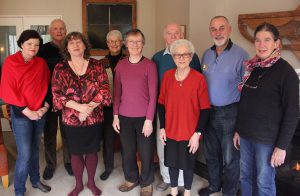
At the national NZCCM council meeting in Wellington (l-r): Charmainne Tolich, Vincent Maire, Ingrid Bryant, Elspeth Preddey, Linda Polaschek, Hugh McLaughlin, Shirley Duthie,
Peter Murphy, Jane Hole. Absent: Damian Robertson. Photo: Supplied
Christian Meditation is an ancient form of contemplative prayer deeply anchored in the teachings of the Early Christian Desert Fathers and Mothers of the fourth and fifth and 5th centuries. It echoes the spirit of the psalmist’s words: ‘Be still and know that I am God’.
The present day spread of meditation in the Christian tradition throughout New Zealand expresses a universal human need for stillness and presence in a world ruled by a pace of change never previously experienced in human history.
In the Wellington and Palmerston North Dioceses some 18 groups meet, usually weekly, for spiritual companionship and meditation. Times and places of many group meetings may be found on the website christianmeditationnz.org.nz or google NZCCM. The Wellington the area co-ordinator is Elspeth Preddey, phone (04) 472-3369 and for the Palmerston North Diocesan area contact Shirley Duthie, phone (06) 856-8110.
As a meditator I am co-ordinator for the area covered by the Palmerston North Diocese. During 2016 I introduced Christian Meditation into the Hawkes Bay Prison and negotiations are underway at present to offer the benefits of Christian Meditation to residents and staff of the Mary Doyle Retirement Village in Havelock North. Meditators report a new depth of prayerful silence and peace and frequently comment on positive mental and physical changes such as less anger, lower blood pressure, increased happiness and more tolerance of difference.
